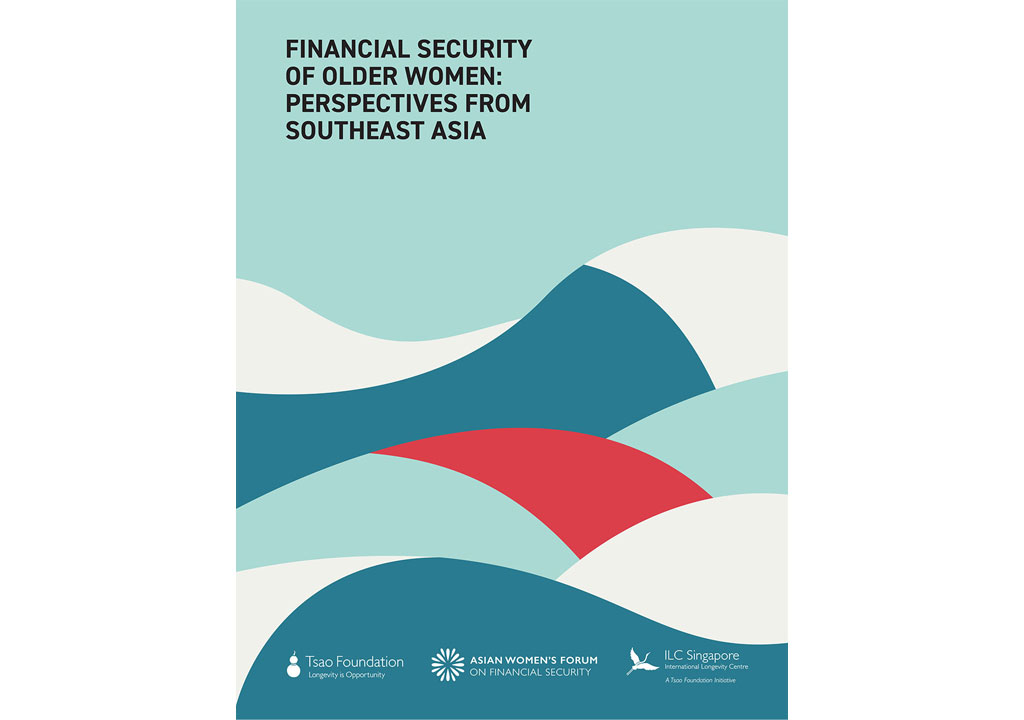Financial Security of Older Women: Perspectives from Southeast Asia
This collective volume is the first cross-country comparative study that assesses the status of financial security of older women in six countries: Indonesia, Malaysia, Myanmar, Philippines, Singapore and Thailand.

Despite wide variations in levels of development, culture and population size, the feminisation of ageing is a major demographic trend being witnessed across the region. Within the next 35 years, there will be more than 70 million older women in the six countries.
Are older women financially prepared for old age?
Do they have sufficient resources to meet their financial needs in old age?
Issues ranging from family support, pensions and savings, employment and caregiving affect women. The report suggests that women’s financial security in old age is the outcome of gender disadvantages earlier in women’s lives (whether it is lower labour force participation or lower levels of education), underlining the need for policy interventions much before women actually get old.
The report argues that without a change in entrenched gender norms on work and caregiving, future cohorts of women will also be at risk of financial insecurity in old age. For change to occur, there is an urgent need for policy interventions that involve multiple stakeholders – from individuals and community to governments and business.
Download Ebook
Kindly fill up the form below.
What do experts say?
This comparative study of older women in the ageing populations of the Asia-Pacific region is long overdue. It focuses on the financial security issue in six of the ten ASEAN countries. It highlights factors for the unequal and low financial reserves of women, as compared to men, such as educational and employment opportunities, and wage gaps, but especially the unequal burdens of informal care work among women. The research findings and policy recommendations should spur action not only on the part of state and civil society actors but, hopefully, also on an inter-governmental level in terms of development schemes targeted at vulnerable older women within the ASEAN community.
Aline Wong — Sociologist and former Singapore Government Representative, ASEAN Commission on the Promotion and Protection of the Rights of Women and Children
This book addresses key demographic and social challenges presently facing Southeast Asian nations. It helps readers connect the dots between gender equity, work-care regimes, and economic security in old age. Its cross-national comparative approach provides nuanced empirical evidence that can assist stakeholders in the public and private sectors in formulating policies that will enhance the wellbeing of the current and future older-aged populations.
Bussarawan Puk Teerawichitchainan — Associate Professor of Sociology, Lee Kong Chian Fellow, Singapore Management University
While there is a great deal of demographic diversity among Southeast Asian countries, the region as a whole is ageing rapidly. The region's demographic transition toward older populations brings to the fore the issue of elderly financial security. The female elderly in particular are at risk of widespread old-age poverty. Southeast Asia continues to grow and develop, and it remains one of the world's most economically dynamic regions. However, growth that impoverishes and marginalises a large and growing segment of the population - i.e. the elderly - cannot possibly be inclusive. This collective volume is a must-read for anybody interested in the issue of female elderly financial security in Southeast Asia. The central message that emerges from this well-written and informative publication is that education and employment hold the key to promoting the financial security of the region's female elderly. The central importance of education and employment resonates across the whole region.
Donghyun Park — Principal Economist, Economic Research and Regional Cooperation Department, Asian Development Bank
This astute, powerful, gender analysis of demographic ageing in six Asia-Pacific countries accurately describes women’s vulnerability in old age. Illustrating the feminisation of population ageing, this book ties lower levels of education, lack of work-force participation, and the unequal gender distribution of domestic work as key contributors to financial insecurity in older women. It chronicles the pressing need for policy change and provides fresh insights into viable solutions to bridge the gaps in financial security faced by women.
Margaret Gillis — President, International Longevity Centre Canada